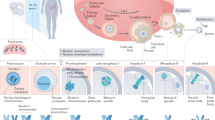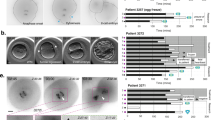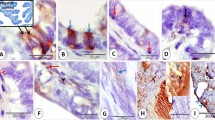Abstract
THE determination of chromosome number in human somatic tissues has been the cause of controversy from time to time. Recently, Timonen1 made an extensive study on the variations of the chromosome number in the human endometrium in the proliferative stage. From a study of one thousand nuclei, he finds that the highest frequency distribution is between 21 and 25 chromosomes. This result has been criticized by Sachs2; the number obtained by him from the same tissue of human beings and from other mammals corresponds to the diploid number of the particular species concerned.
This is a preview of subscription content, access via your institution
Access options
Subscribe to this journal
Receive 51 print issues and online access
$199.00 per year
only $3.90 per issue
Buy this article
- Purchase on Springer Link
- Instant access to full article PDF
Prices may be subject to local taxes which are calculated during checkout
Similar content being viewed by others
References
Timonen, S., Acta Obst. et Gynec. Scandinav., 31, Supp. 2, 1 (1950).
Sachs, L., Nature, 172, 205 (1953).
Gopal-Ayengar, A. R., Brit. Emp. Can. Camp., 20th Ann. Rep., 55 (1952).
Author information
Authors and Affiliations
Rights and permissions
About this article
Cite this article
MANNA, G. Chromosome Number of Human Endometrium. Nature 173, 271–272 (1954). https://doi.org/10.1038/173271a0
Issue Date:
DOI: https://doi.org/10.1038/173271a0
This article is cited by
-
Chromosomal Constitution of Human Endometrium
Nature (1966)
-
The normal karyotype in mice of a highly leukemic AKR strain
Bulletin of Experimental Biology and Medicine (1966)
-
Cytophotometrische Untersuchungen am menschlichen Portioepithel w�hrend der Krebsentwicklung
Zeitschrift f�r Krebsforschung (1961)
-
Aneuploide Chromosomenzahlen in den Mitosen der Leber Verschieden alter Ratten
Chromosoma (1957)
-
Chromosome constancy in the corneal epithelium of the mouse
Chromosoma (1956)
Comments
By submitting a comment you agree to abide by our Terms and Community Guidelines. If you find something abusive or that does not comply with our terms or guidelines please flag it as inappropriate.



